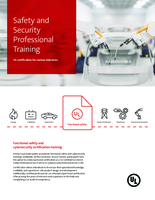
What is functional safety in today's systems?
Functional safety is about reducing the risks of simple and complex systems, such that they function safely in the event there is an electrical or electronic malfunction. As more products incorporate complex microelectronics and software into their design, it becomes increasingly challenging for quality and safety engineers to assess and implement functional safety at the system level.
These products and systems are also incorporating connectivity. Therefore, functional safety cannot be considered alone. Instead, considering functional safety and cybersecurity together from the start of a product's life cycle helps manufacturers and system integrators to maintain products' and systems' safety and security. Many regulatory updates now require evaluations of both functional safety and cybersecurity to meet compliance requirements, so working with experts in both fields has become increasingly important. Engaging these processes from the onset of product development is crucial for minimizing risks and confirming that products meet both functional safety and cybersecurity standards.

UL Solutions Hosts Cyber & Digital Trust Symposium
Hear from experts and discover how you can build cyber resilience into the core of your business.
Navigating complexities of functional safety
Functional safety provides a roadmap to help engineers make their systems safer. At UL Solutions, we can help evaluate for functional safety and offer resources, training and certification programs for engineers across a variety of disciplines.
How UL Solutions helps shape the functional safety landscape
UL Solutions is dedicated to helping customers navigate the complex technical and regulatory challenges of today’s functional safety landscape. With our extensive certification expertise and holistic approach to safety and security, we can help guide customers through the intertwined domains of functional safety and cybersecurity so they can incorporate them into products and systems associated with Industry 4.0.
We offer training, advisory, reviews, audits and certification, and can be a pivotal resource for manufacturers, system integrators and asset owners across various industries, including industrial automation, renewable energy and automotive sectors. Our services can help these industry stakeholders meet global regulatory requirements; strengthen industrial systems against vulnerabilities; mitigate the risk of injury, offline machinery and subsequent production downtime; and protect their brand.
Solutions serving critical business needs
UL Solutions offers functional safety for the following segments:
Industrial functional safety and cybersecurity
Our industrial functional safety and cybersecurity services span multiple industries, including:
- Energy systems and renewables.
- Industrial automation systems and components.
- Machinery, agriculture, construction and robotics.
- The process industry, including hazardous locations and oil and gas.
Equipment and machinery used in the manufacturing process are becoming increasingly complex through innovative applications of technology and software. To gain access to customers in the global marketplace, producers of these modern products must adhere to international cybersecurity and functional safety requirements, such as the Machinery Directive 2006/42/EC of Europe and U.S. Occupational Safety and Health Administration (OSHA) regulations. We apply our functional safety and cybersecurity assessment and certification services and engineering expertise to help manufacturers meet the requirements of international regulations and gain access to global markets with speed and ease.
Expertise in functional safety standards:
Automotive functional safety and cybersecurity
As vehicles become more connected, autonomous and capable, safety control systems become far more complex. We can help bring clarity to cybersecurity and functional safety process, assessment and compliance. Our automotive functional safety and cybersecurity team understands the fundamental principles and concepts of functional safety and cybersecurity across industries and subject matters as well as the nuances of relevant standards. Leveraging this broad expertise is critical when developing control systems for safety-related applications in increasingly interconnected vehicles.
Expertise in functional safety standards:
Artificial intelligence and autonomy safety
As artificial intelligence (AI) becomes more commonplace in safety-related systems, we need to understand how to evaluate these systems. At UL Solutions, we offer training, advisory, and assessment services for AI systems in safety-related applications including autonomous vehicles, robotics, and other systems that increase levels of automation.
Expertise in functional safety standards:
Benefits of working with UL Solutions for automotive and industrial functional safety
Building on our safety science and engineering expertise in many functional safety domains, we empower manufacturers, system integrators, and suppliers around the world to enhance project efficiencies and speed to market by bundling our traditional product safety evaluations with functional safety and cybersecurity assessments.
We can help customers:
- Determine the best assessment process for specific products, processes, and applications.
- Address global standards and regulatory requirements.
- Where and when applicable, reinforce a point of differentiation in the marketplace through the use of the UL Mark, a recognized symbol of trust around the world.
Functional safety personnel certifications and training
The UL Certified Functional Safety Certification Program offers individuals an opportunity to set themselves apart with a credential focused on critical functional safety knowledge and skills. Personnel certification and training in this area help individuals demonstrate their knowledge of industry practices, as evidenced by the completion of several competencies. Learn more about our functional safety personnel certification and training programs.
Functional safety builds trust
UL Solutions provides expert independent safety assessments, audits and certification. We can assess both functional safety and autonomous safety, as well as provide resources, training and certification programs across a variety of disciplines and safety standards.












